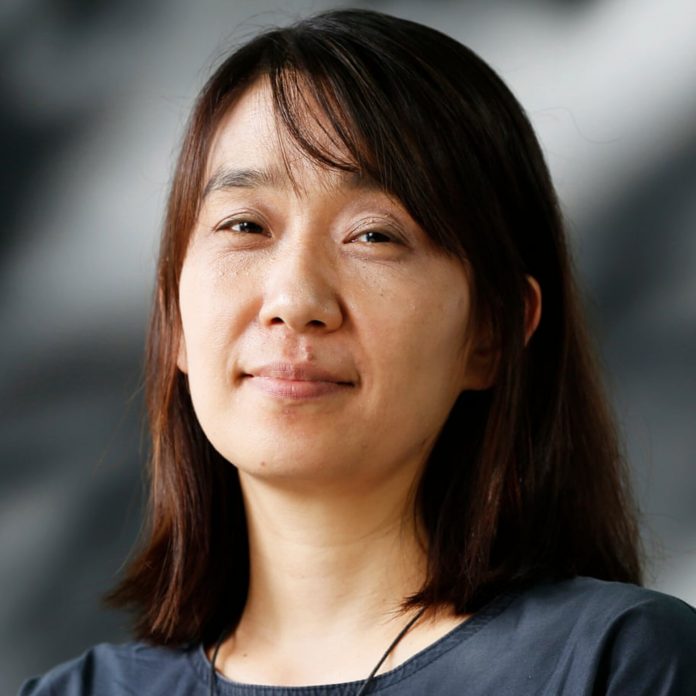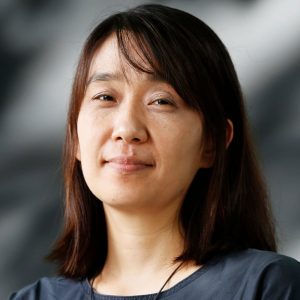Han Kang
By Adebayo Obajemu
South Korean author Han Kang has won 2024 Nobel Prize in literature
The first South Korean to win the literature prize. Her win has been surprising given by the passing over of the favourite contenders like the mystery of the Nobel Literature Awards itself, which some times go to virtually unknown writers. Like Claude Simon, the French writer, who won it in 1985, this year’s award has again proved book-makers and pundits wrong.
Reason!? The Chinese author Can Xue was top frontrunner to win the 2024 prize. Can, 71, was the top prediction to win last year’s prize. However, she was pipped by the 2023 Nobel winner, Norwegian writer Jon Fosse.
An elated Hang said she would ‘celebrate it quietly’ and have tea with her son. Kang was born in 1970 in the South Korean city of Gwangju .
According to Swedish Academy’s Nobel Committee, she was awarded “for her intense poetic prose that confronts historical traumas and exposes the fragility of human life”.
Mats Malm, permanent secretary of the Swedish Academy’s Nobel Committee, announced the prize in Stockholm last Thursday.
Han, 53, is the first South Korean writer and 18th woman to win the Nobel Literature Prize.
She had previously won the Man Booker International Prize for fiction in 2016 for “The Vegetarian”, a novel about a woman’s descent into mental illness and neglect from her family. It was the first of her books to be published in English.
Her other notable works include 2011’s “Greek Lessons”, 2016’s “The White Book” and 2021’s “We Do Not Part.”
Malm said he was able to talk to Han by phone after announcing her as the winner. “She was having an ordinary day it seemed – had just finished supper with her son. She wasn’t really prepared for this.”
“I’m so surprised and honoured,” Han said, adding, “I’d like to have tea with my son. I’ll celebrate it quietly.”
Nobel committee chairman Anders Olsson, praised her “physical empathy for the vulnerable, often female lives” of her characters.
“She has a unique awareness of the connections between body and soul, the living and the dead, and in her poetic and experimental style has become an innovator in contemporary prose,” Olsson said.
Anna-Karin Palm, a committee member, said Han writes about “trauma, pain and loss”, whether individual or collective, “with the same compassion and care” and called her lyrical prose “both tender and brutal”.
The 2023 prize went to Norwegian author and dramatist Jon Fosse, who was honoured for “his innovative plays and prose, which give voice to the unsayable”.
The literature prize has long been male-dominated. The last woman to win was Annie Ernaux of France, in 2022.
The prize carries a cash award of 11 million Swedish kronor ($1m) from a bequest left by the award’s creator, Swedish inventor Alfred Nobel. Alongside the cash prize, the winners will be presented with a medal on December 10.
Han was born in 1970 in the South Korean city of Gwangju before moving with her family to Seoul at the age of nine. She comes from a literary background as her father, Han Seung-won, is a reputed novelist.
She began her career in 1993 with the publication of several poems in the magazine, Literature and Society, her prose debut coming in 1995 with the short story collection, Love of Yeosu.
Her major international breakthrough came in 2007 with the novel, The Vegetarian. Written in three parts, it is an unsettling novel in which a woman’s decision to stop eating meat has devastating consequences.
In the 2014 novel, Human Acts, set in the city of Gwangju, where she grew up, Han confronted her country’s history of state violence by giving voice to the victims of a massacre carried out by the South Korean military in 1980.
The committee said her work is characterized by a “double exposure of pain, a correspondence between mental and physical torment with close connections to Eastern thinking”.
Mentioned as a case in point is her 2013 novel, Convalescence, which involves a leg ulcer that refuses to heal and a painful relationship between the main character and her dead sister.
“She has a unique awareness of the connections between body and soul, the living and the dead, and in her poetic and experimental style has become an innovator in contemporary prose,” the committee said.
Han is the second South Korean to win a Nobel Prize. Late former President Kim Dae-jung won the peace prize in 2000 for his efforts to restore democracy in South Korea during the country’s previous military rule and improve relations with war-divided rival North Korea.
Can was the top pundits’ choice to win this year. Can also lost out to Jon Fosse, the Norwegian dramatist in 2023.
Fosse was considered a somewhat surprising choice for the prize, as his work in plays, novels, poetry and essays rarely appeared in translation beyond his large Norwegian audiences. However, the Nobel committee commended the writer’s extensive bibliography, in particular “Septology”. Published in English by Fitzcarraldo Press, the seven book 1,250-page epic first released between 2019 and 2021 was considered his “magnum opus”.
Though Kang has been the lucky pick, she slugged it out with literary heavyweights: topping the list was Can Xue.
Can, real name Deng Xiaohua, was born in 1953, and grew up under the strain of her parents’denouncement by the Communist Party as rightists. It’s an experience that has influenced her avant-garde work that broke with the traditional literary styles in China.
Best known for her short-story collections, many critics have argued that English translations rarely capture the idiosyncratic stylings Can uses. Nevertheless, it seems her most recent novel, 2019’s “Barefoot Doctor” has put her firmly in the sights of the Nobel committee.
She is also known for her insightful literary criticism of authors, including those from the Western canon, such as Dante, Jorge Luis Borges, and Franz Kafka. Can has also been longlisted twice for the International Booker Prize with her novel “Love in the New Millennium” and short story collection “I Live in the Slums”.
Despite the odds being in her favour, Can was in this exact position a year ago and the award was given to Fosse, considered an underdog for the prize.
Gerald Murnane
Another name to show up in last year’s predictions was the Australian writer Gerald Murnane, often considered the “greatest living English-language writer” and is regularly tipped. Murnane, 85, is one of those writers who few have heard of, but those who have will insist he’s about as great as writers get. Perhaps best known for his 1982 novel “The Plains” and 1988 novel “Inland”, both novels are exemplary of his peculiar self-referential style that comments on his artistry itself.
Haruki Murakami
Murakami rose to international fame with his nostalgic romance novel “Norwegian Wood” in 1987. Since then, he’s created a name for his running theme of magical realism, exemplified by his novels “Kafka on the Shore” and “The Wind-Up Bird Chronicle”.
Murakami has long been touted for the prize, having already won basically every other award in literature. His works have also entered the public consciousness through the myriad adaptations into film, with recent notable additions including the fantastic Burning and the Oscar-winning Drive My Car. This year, the English translation of his 2023 novel “The City and Its Uncertain Walls” was released. It won’t make a difference.
This year did not feature any African writer. The last time was in 2021 when Abdulrazak Gurnah won the prize
“for his uncompromising and compassionate penetration of the effects of colonialism and the fate of the refugee in the gulf between cultures and continents”
The first African to win the prize is Wole Soyinka who in 1986 was awarded for
“who in a wide cultural perspective and with poetic overtones fashions the drama of existence.”
This was followed in 1988 by
Naguib Mahfouz who was given for
“who, through works rich in nuance – now clear-sightedly realistic, now evocatively ambiguous – has formed an Arabian narrative art that applies to all mankind”
Africa took it again in 1991 when it went to White South African
Nadine Gordimer for “who through her magnificent epic writing has – in the words of Alfred Nobel – been of very great benefit to humanity.”
The Nobel Prize in Literature 1992 went to Caribbean writer of Black heritage the poet Derek Walcott;
“for a poetic oeuvre of great luminosity, sustained by a historical vision, the outcome of a multicultural commitment”
This was followed in 1993 by another Black diasporan,Toni Morrison; “who in novels characterized by visionary force and poetic import, gives life to an essential aspect of American reality”
The Prize went to African homeland again in 2007 but to another White South African Doris Lessing for works “that epicist of the female experience, who with scepticism, fire and visionary power has subjected a divided civilisation to scrutiny”
There are many important African writers, who have not been awarded in spite of their rich ouvre like late Chinua Achebe, Ngugi wa Thiongo, Ayi Kwei Armah Okot’pitek and others.
Dr. Yakubu Dabai, a literary critic and media consultant, told National Waves that “Kang handling of plot and characterisation and her deep insight into human psychology as well as her compact prose have placed her in the league of leading prose stylists of contemporary fiction.”
The Literature prize has long faced criticism that it is too focused on European and North American writers of style-heavy, story-light prose. It has also been male-dominated, with just now 18 women among its 119 laureates.
The Literature prize has long faced criticism that it is too focused on European and North American writers of style-heavy, story-light prose. It has also been male-dominated, with just now 18 women among its 119 laureates.
It would be recalled that six days of Nobel announcements opened last Monday with Americans Victor Ambros and Gary Ruvkun winning the Medicine prize. Two founding fathers of machine learning — John Hopfield and Geoffrey Hinton — won the Physics prize last Tuesday, while on Wednesday three scientists who discovered powerful techniques to decode and even design novel proteins were awarded the Nobel Prize in Chemistry.
The Nobel Prize committee has annually awarded a winner in literature since 1901 and is traditionally the final award announced of the selection. To this day, it has been awarded 116 times to 120 individuals, with 103 men and just 17 women taking home the prize.
The prize carries a cash award of 11 million Swedish kronor (€967,000) from a bequest left by the award’s creator, Swedish inventor Alfred Nobel. The laureates are invited to receive their awards at ceremonies on 10 December, the anniversary of Nobel’s death.


